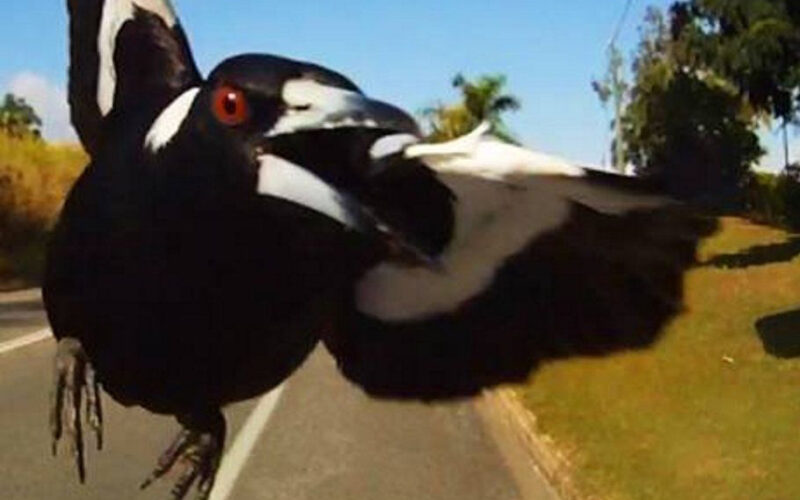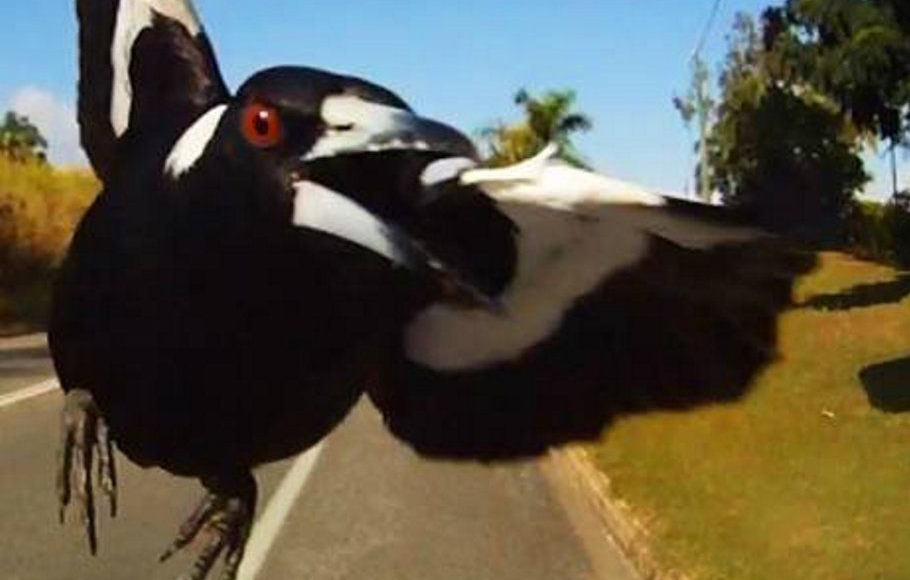Magpies are attacking cyclists because it’s Spring
I know I write about this topic every year, but those swooping Magpies attacking cyclists are a really big deal in my home town of Sydney. For the record, I really love birds and think they play a key role in our urban environments. I particularly enjoy hearing the beautiful warble of the Magpies in the early morning but I’m not so keen when they dive bomb me while I’m riding by.
So far this year, I’ve evaded swooping Magpies but I doubt I’ll get through Spring without at least one angry bird trying to chase me out of his territory. But like many threats in life, by changing your attitude towards swooping Magpies, you can feel much more relaxed about the idea. How so, you might be thinking.
Over the past few years, I’ve realised that most Magpies don’t swoop cyclists at all, and of those that do, very few will make contact with you. The ones that do make contact will usually just tap lightly on your helmet and then leave you alone. One thing I’ve also noticed is Magpies generally come from behind so unless you see a looming shadow you’re not aware of the swooping until it’s over.
Having said all that, my main strategy to minimise Magpie swooping is to avoid the area, but if you find yourself in a surprise attack, the only way to handle the situation is to remain calm and continue on your way.
Most people are injured from falling off the bike or into oncoming traffic than the actual bird attack which is why it’s important to stay calm and keep riding.
Magpies seem to get most of the attention, but in my local area, there are a couple of very vicious Butcherbirds that re-emerge at this time of year to protect their babies.
Native birds such as Australian Magpies are highly protective of their eggs, nest and young and will often swoop at unsuspecting passers-by if they feel threatened. Other native Australian birds that are also common culprits include Butcherbirds, Kookaburras and Plovers, but even invasive species like Indian Mynas can attack at this time of year. Magpies seem to cop the majority of the blame but from my experience butcherbirds are more vicious.
Only a small proportion of birds swoop on people and these often have a preference for a few individuals that the birds recognise or certain types of ‘targets’ like cyclists. A Magpie will only defend its nest within a ‘defence zone’. For cyclists, this is usually an area within 150 metres.
Almost all swoops on people are carried out by male birds defending their eggs and chicks, which are in the nest for about six to eight weeks between July and November.
To help you know in advance about particularly aggressive birds there’s a very handy website called Magpie Alert that lists known locations.
You can also share the information about locations of attacking birds with fellow cyclists via social media like Facebook pages for your local cycling group and other ways you communicate with fellow cyclists.
Here are a few other tips that might help:
- Consider taking a different route if you know where a ‘swooping’ bird is nesting
- They generally only attack solo or small groups of cyclists so ride in a tight bunch (not always practical because there’s always going to be a certain amount of riding when you’re on your own)
- Wear sunglasses to protect your eyes
- You may choose to dismount to avoid danger from traffic or a fall. Once you have dismounted, look at the bird directly; magpies and other birds usually won’t attack when you are watching them
Here’s what doesn’t work:
- Painting eyes on your helmet is not very effective as magpies have good eyesight and can learn the difference between painted and real eyes
- Putting cable ties on your helmet that stick up to deflect the swooping bird doesn’t appear to work. I’ve found no conclusive evidence in my research and frankly, I’d rather take the risk than look like a dork.


